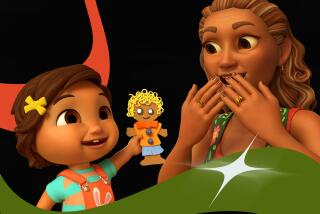Just reading between the punch lines
- Share via
THERE are plenty of abuelitas speaking in Spanish on the prime-time lineup if you click your remote toward Univision and Telemundo. But now there’s a Spanish-speaking grandma on ABC who also speaks English, but refuses to do so.
She’s funny, feisty, and the grandmother on “Freddie,” the new sitcom starring and co-created by Freddie Prinze Jr. and his best friend, Conrad Jackson. Whenever Grandma speaks, her lines are subtitled because, like many immigrants, she chooses to speak in her native language at home. It is a characteristic that Prinze and Jackson were unwilling to compromise.
“My grandmother lived in America and only spoke Italian,” said Jackson, 29, who is half Jamaican and half Italian. “As far as what’s real in society, it’s relatable and it’s something that really happens.
“It’s just stupid that you have to point that out,” Jackson added, “but hopefully people will respond well to our show and open doors to new ideas.”
Prinze grew up with his mother’s Italian family, eating Italian food and learning the language. The son of the late Freddie Prinze Sr. also spent summers in Puerto Rico with his father’s family, eating native cuisine and speaking in Spanish.
Although actress Jenny Gago, who plays the grandmother, was born in Lima, Peru, she moved to the Bronx when she was 6 and grew up surrounded by Cubans and Puerto Ricans, she said. This explains why her Puerto Rican accent sounds so authentic.
“When I was growing up, the whole mental point was assimilate and teach your kids to speak English and let them assimilate into the culture, blah, blah, blah,” Gago said. “My mom was like, ‘Are you kidding me?’ No, no, no. Espanol en mi casa. And she was very adamant that we only speak Spanish at home. So for me to have the opportunity to play a character like this, I just flipped out!”
Grandma was able to remain a Spanish-speaker in large part because of the support of Steve McPherson, president of prime-time entertainment at ABC. Executives who hesitated wondered if viewers would disengage from a character who always spoke a foreign language, he said. Last year, ABC broke ground with the South Korean couple on “Lost” whose conversations are subtitled because they speak to each other in their native language.
“I think that’s one of the most innovative character designs I’ve seen in many years,” McPherson said. “We talk about diversity so much, and so many times it’s so inorganic in terms of the way it’s used. I feel that example and the Korean couple on ‘Lost’ are some of the best demonstrations of how incredibly compelling characters can even cross over the language barrier. I think in the diverse culture we live in, that’s far more truthful than some of the stuff we have on.”
As Latinos have grown into the largest minority population, McPherson said he frequently hears conversations in which one person is speaking English and the other is speaking a different language, and the flow is seamless.
“And that’s the real world,” he said. “On ‘Freddie,’ not only is there similitude to it, but to me, it lends to the comedic side of it. Only certain people in her dynamic understand what she’s saying, while the audience obviously will see it all. But there are characters that play off of her, assuming they know what she’s saying. And the juxtaposition of what they think she’s saying as opposed to what she’s really saying sometimes is the biggest joke in the scene.”
Gago said she has waited two decades for a role like this. Perhaps viewers have too: With 9.4 million tuning in, “Freddie” was the No. 1 show in its time slot when it premiered Oct. 12.
“She’s a real welcome challenge because she’s all outspoken and rebellious,” Gago said. “But I want to maintain that sense of dignity and authenticity. Otherwise, Latinos are not going to be able to relate.
“These are the kinds of things I’ve been waiting to see for 20 years. We have to be the ones to make sure that we are portrayed in the light we should be portrayed in.
“I’m not saying we’re all saints, but we’ve already seen the other end of it.”
More to Read
The complete guide to home viewing
Get Screen Gab for everything about the TV shows and streaming movies everyone’s talking about.
You may occasionally receive promotional content from the Los Angeles Times.






